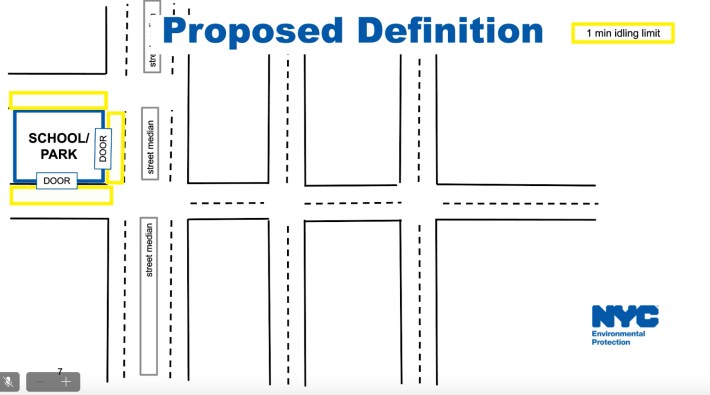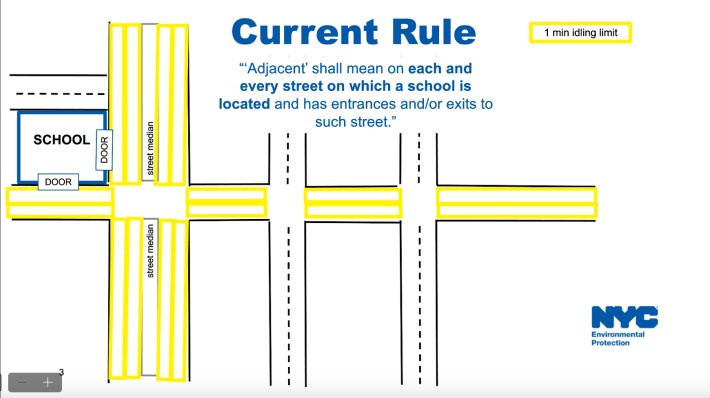The city’s effort to loosen vehicle idling regulations around schools came under fire on Thursday at a public hearing where anti-pollution advocates and other breathers said environmental officials are working to make it easier for motorists to run their engines at the expense of children’s health.
Drivers can currently idle for no more than one minute outside educational facilities — the limit is three minutes for the rest of city — but the Department of Environmental Protection is seeking to narrow the definition of “adjacent” in a way that would allow motorists to simply move down the block, or across the street, from a school to be out of the one-minute zone.
Current rules cover the entire street outside a school, which makes sense because spewing fumes waft, one parent noted.
“It's like a no-peeing section in a pool,” testified David Turner. "If a car is idling across the street, all those particulate matter ... is just gonna come right across the street to the school."

The city’s move to narrow the definition of “adjacent” came in response to a Council bill last year that aimed to expand the one-minute zones to streets outside parks, and the lawmaker behind that law said DEP’s rule change “flies in the face” of the effort to rein in polluters.
“I want to make it clear that the legislative intent of this bill was to expand protections for children across the city, especially for those living with asthma as so many in my district do,” Council Member Alexa Avilés (D–Sunset Park) said at the hearing. “I am surprised to have to be here to reiterate this intent as it has been made clear over and over again.”
The city launched the citizen reporting part of its anti-idling effort in 2019, allowing New Yorkers to report commercial vehicles — and get a piece of any resulting fine. That rule spawned a small army of reporters that frequently flag offending truckers. The city famously promoted the initiative, rebranded "Billy Never Idles," at the onset of the COVID-19 pandemic in 2020.
DEP representatives started the one-hour online public input session with a presentation that wrongly cited a recent decision as evidence that the existing environmental protections are too broad.
“The current rule simply says that 'adjacent' means on the same street as the school or entrance or exit, without any consideration for how long the street might be,” said DEP’s director of legislative affairs Carleen McLaughlin, citing the ruling by the city’s Office of Administrative Trials and Hearings and showing a map that the critics said was not accurate:

“The [OATH] decision points out that a vehicle could be adjacent even if it is miles away, just because somewhere along the street there's a school door. The decision points out the example that someone idling on Broadway in Lower Manhattan could be impacted by a school on Broadway in the Bronx,” McLaughlin said.
But the January decision by OATH says nothing of the kind; it defines the same "street" to mean on the same block, thus negating the very concerns that DEP presented in its slides.
“The Board reasonably limits ‘street’… to the block face on which the school in question is located,” the Jan. 24 decision reads.
Speakers at the hearing accused the agency of flat-out misleading the public.
“The court is right ... and it's clear — crystal clear,” said Ernest Welde, an environmental attorney and frequent idling violation filer. “[McLaughlin] completely misled the whole group by her quote.”
None of the roughly dozen people giving their input spoke in favor of the rule change, and the agency will consider the feedback, along with written comments online before publishing a final rule, officials said.
“You're acting like the Department of Enabling Polluters,” added Welde. "DEP has been, since the beginning of this [civilian reporting] program, sabotaging this program, actively trying to limit citizen participation, and this is just another way for them to accomplish this."
DEP spokesman Ted Timbers claimed that the legal decision “confirms that the current written rule is not considered workable by OATH.”
“We appreciate the passion of those who spoke, and everyone’s comments will be closely considered before a final rule is published,” Timbers said.
It's not the first time that DEP officials have cited an OATH decision as reason for changing the rules. DEP recently claimed that residents could no longer file complaints of idling vehicles if the trucks don’t have plates, as Streetsblog reported exclusively.
The agency also has a special carveout for school buses, allowing their operators to idle for a whopping 30 minutes around pick-up and drop-off times "to maintain passenger comfort," according to a section buried in its Frequently Asked Questions page.






